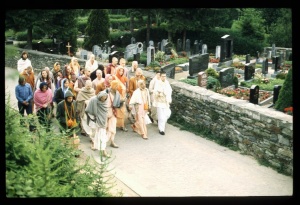CC Madhya 24.180: Difference between revisions
No edit summary |
(Vanibot #0054 edit - transform synonyms into clickable links, which search similar occurrences) |
||
| Line 17: | Line 17: | ||
<div class="synonyms"> | <div class="synonyms"> | ||
''kiṁvā'' | ''[//vanipedia.org/wiki/Special:VaniSearch?s=kiṁvā&tab=syno_o&ds=1 kiṁvā]'' — or; ''[//vanipedia.org/wiki/Special:VaniSearch?s=dhṛti&tab=syno_o&ds=1 dhṛti]-[//vanipedia.org/wiki/Special:VaniSearch?s=śabde&tab=syno_o&ds=1 śabde]'' — by the word ''dhṛti''; ''[//vanipedia.org/wiki/Special:VaniSearch?s=nija&tab=syno_o&ds=1 nija]'' — own; ''[//vanipedia.org/wiki/Special:VaniSearch?s=pūrṇatā&tab=syno_o&ds=1 pūrṇatā]-[//vanipedia.org/wiki/Special:VaniSearch?s=ādi&tab=syno_o&ds=1 ādi]'' — perfection and so on; ''[//vanipedia.org/wiki/Special:VaniSearch?s=jñāna&tab=syno_o&ds=1 jñāna]'' — knowledge; ''[//vanipedia.org/wiki/Special:VaniSearch?s=kaya&tab=syno_o&ds=1 kaya]'' — says; ''[//vanipedia.org/wiki/Special:VaniSearch?s=duḥkha&tab=syno_o&ds=1 duḥkha]-[//vanipedia.org/wiki/Special:VaniSearch?s=abhāve&tab=syno_o&ds=1 abhāve]'' — in the absence of all material miseries; ''[//vanipedia.org/wiki/Special:VaniSearch?s=uttama&tab=syno_o&ds=1 uttama]'' — the best; ''[//vanipedia.org/wiki/Special:VaniSearch?s=prāptye&tab=syno_o&ds=1 prāptye]'' — by obtaining; ''[//vanipedia.org/wiki/Special:VaniSearch?s=mahā&tab=syno_o&ds=1 mahā]-[//vanipedia.org/wiki/Special:VaniSearch?s=pūrṇa&tab=syno_o&ds=1 pūrṇa] [//vanipedia.org/wiki/Special:VaniSearch?s=haya&tab=syno_o&ds=1 haya]'' — becomes perfectly perfect. | ||
</div> | </div> | ||
Latest revision as of 23:03, 19 February 2024
Śrī Caitanya-caritāmṛta - Madhya-līlā - Chapter 24: The Sixty-One Explanations of the Atmārāma Verse

His Divine Grace
A.C. Bhaktivedanta Swami Prabhupada
A.C. Bhaktivedanta Swami Prabhupada
TEXT 180
- kiṁvā 'dhṛti'-śabde nija-pūrṇatādi-jñāna kaya
- duḥkhābhāve uttama-prāptye mahā-pūrṇa haya
SYNONYMS
kiṁvā — or; dhṛti-śabde — by the word dhṛti; nija — own; pūrṇatā-ādi — perfection and so on; jñāna — knowledge; kaya — says; duḥkha-abhāve — in the absence of all material miseries; uttama — the best; prāptye — by obtaining; mahā-pūrṇa haya — becomes perfectly perfect.
TRANSLATION
"The word 'dhṛti' is also used when one is fully perfect in knowledge. When, due to having obtained the lotus feet of the Supreme Personality of Godhead, one has no material miseries, he attains mahā-pūrṇa, the highest level of perfection.